1971 plymouth barracuda 71 in violet and white interior
- Location: Grover Beach, California, United States
- Condition: Used
- Make: Plymouth
- Model: Barracuda
- Type: Coupe
- Trim: barracuda
- Year: 1971
- Mileage: 70,000
- VIN: Bh23g1b159021
- Color: purple
- Engine size: 383
- Number of cylinders: 8
- Fuel: Gasoline
- Transmission: Automatic
- Interior color: White
- Vehicle Title: Clear
1971 Plymouth Barracuda barracuda Description
1971 BARRACUDA PLYMOUTH purple / white interior
This was the colors original
Bh23g1b159021
I have had this barracuda for 20 years it was painted 18 years ago the 383 was installed by the original owner took out the 318 (318 paid low INSURANCE)
The auto transmission and rear was updated for the 383 engine.
I did reasonably put in the correctly rear springs
Newer tires and newer correct rims added.
The interior white seats were from legendary
This car runs and correct well. I put many new or good parts when I did it 18 years ago.
Always great thumb ups and waves from people.
Auto transmission was rebuilt about 3 years ago
I did what it needed to be a driver runs great
The painter but some different in the paint (metallic)
Mopar nuts said it should not be in paint metallic.
It had the rust was replaced with metal
purchased new in san luis obispo california
Please call me 805-709-7957 tony (text ok)
The third-generation 1970 to 1974E-bodyBarracuda, was no longer based on the Valiant. The completely new design was shared with theDodge Challengerand available in hardtop and convertible body styles. The Barracuda was discontinued after the 1974 model year.
The redesign for the 1970 Barracuda removed all its previouscommonalitywith the Valiant. The original fastback design was deleted from the line and the Barracuda now consisted of coupe and convertible models. The all-new model, styled byJohn E. Herlitz, was built on a shorter, wider version of Chrysler's existingB platform, called theE-body.[12]Sharing this platform was the newly launchedDodge Challenger; however no exterior sheet metal interchanged between the two cars, and the Challenger, at 110 inches (2,800mm), had a wheelbase that was 2 inches (51mm) longer than the Barracuda.
The E-body Barracuda was now "able to shake the stigma of 'economy car'."[13]Three versions were offered for 1970 and 1971: the base Barracuda (BH), the luxury oriented Gran Coupe (BP), and the sport model 'Cuda (BS).[14]Beginning mid year 1970, and ending with the 1971 model, there also was the Barracuda Coupe (A93), a low-end model which included the 198ci Slant Six as a base engine, lower grade interior, and (like other Coupe series Chrysler Corp. offered that year) had fixed quarter glass instead of roll-down rear passenger windows.[15]The high-performance models were marketed as'Cudaderiving from the 1969 option. The E-body's engine bay was larger than that of the previous A-body, facilitating the release of Chrysler's 426cuin (7.0L)Hemifor the regular retail market.[citation needed]1970 Plymouth Hemi 'Cuda, raced by the Chrysler France works team in 1970-1973
For 1970 and 1971, the Barracuda and Barracuda Gran Coupe had twosix-cylinder enginesavailable — a new 198cuin (3.2L) version of the slant-6, and the 225 — as well as three different V8s: the 318ci, the 383ci with two-barrel carburetor and single exhaust, and the 383ci with four-barrel carburetor and dual exhaust 330hp (250kW) SAE gross. The Cuda had the 383ci 335hp (250kW) SAE gross (same as Dodge's 383 Magnum) as the standard engine. It also had the 440ci four-barrel Super Commando, the 440ci six-barrel Super Commando Six Pak, and the 426ci Hemi.[16]The 440- and Hemi-equipped cars received upgraded suspension components and structural reinforcements to help transfer the power to the road.[citation needed]
In 1970 the power plant options offered to the customer were:
1. 275hp (200kW) SAE gross in the 340-4V.
2. 335hp (250kW) SAE gross in the high performance 383-4V,
3. 375hp (280kW) SAE gross in the 440-4V,
4. 390hp (290kW) SAE gross in the 440-6V, and
5. 425hp (317kW) SAE gross in the 426-8V.
 1970 Plymouth Barracuda 69487 Miles In-Violet Convertible 383 V8 4 Speed Manual
1970 Plymouth Barracuda 69487 Miles In-Violet Convertible 383 V8 4 Speed Manual
Mileage: 69487
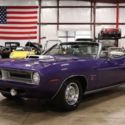 1970 Plymouth Barracuda 69487 Miles In-Violet Convertible 383 V8 5 Speed Manual
1970 Plymouth Barracuda 69487 Miles In-Violet Convertible 383 V8 5 Speed Manual
Mileage: 69487
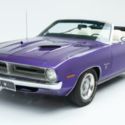 1970 Plymouth Barracuda Grand Coup 73,981 Miles violet Convertible 383 Automatic
1970 Plymouth Barracuda Grand Coup 73,981 Miles violet Convertible 383 Automatic
Mileage: 73981
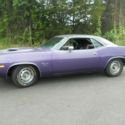 1970 PLYMOUTH BARRACUDA IN VIOLET 383 CUDA 4 SPEED Factory A/C PLUM CRAZY
1970 PLYMOUTH BARRACUDA IN VIOLET 383 CUDA 4 SPEED Factory A/C PLUM CRAZY
Mileage: 222222
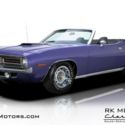 1970 Plymouth Barracuda HEMI Cuda Tribute In Violet Convertible 426 HEMI V8 4 Sp
1970 Plymouth Barracuda HEMI Cuda Tribute In Violet Convertible 426 HEMI V8 4 Sp
Mileage: 1850
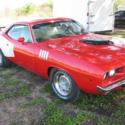 1971 Plymouth Barracuda Recreration RED/White 472 HEMI Automatic
1971 Plymouth Barracuda Recreration RED/White 472 HEMI Automatic
Mileage: 278
 1971 Plymouth Barracuda A/C, power disc brakes and deluxe interior 147373 Miles
1971 Plymouth Barracuda A/C, power disc brakes and deluxe interior 147373 Miles
Mileage: 147,373
 1971 PLYMOUTH CUDA 383 IN Violet (Plumb Crazy) Billboard Car
1971 PLYMOUTH CUDA 383 IN Violet (Plumb Crazy) Billboard Car
Mileage: 99,999
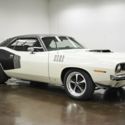 1971 Plymouth Barracuda Hemi Resto-Mod 10 Miles White Hardtop Ray Barton Racing
1971 Plymouth Barracuda Hemi Resto-Mod 10 Miles White Hardtop Ray Barton Racing
Mileage: 10













 1971 Plymouth GTX Real In-Violet Plum Crazy 440 Super Commando 1 of 105 built
1971 Plymouth GTX Real In-Violet Plum Crazy 440 Super Commando 1 of 105 built